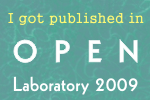Celebromics? HeavyMetalomics? Advertomics? Anniversomics!
René Goscinny would probably have done a better job of naming the new trend of personal genomics (genomix?) companies to sequence celebrities genomes. Heck, we might have even done Obelix’s and Asterix’s genomes to find out if Obelix can drink the magic potion without Getafix’s (Panoramix’s) admonishments that it might do him harm, or to find out how Asterix can control the feathers in his helmet. I believe that any good, comical or neutral publicity for genomics is a good thing. Hence, last week’s headline in The Sunday Times announcing that “Genetics to solve why Ozzy Osbourne is still alive” is a still a good thing, tongue-in-lacerated-cheek attitude nonwithstanding. If something is revealed about Ozzy’s robustness to decades of substance abuse that helps the rest of us, so much the better. The more likely case would be that Ozzy’s geneomic makeup will reveal certain irregularities, which may or may not be correlated with his remarkable tolerance for alcohol, drugs and the consumption of raw animals on stage.
I must add that in my humble opinion making Ozzy the Sunday Times’s health advice columnist might be taking things a bit too far. (Next they’ll be putting Hannibal Lecter in charge of the personal relationships advice column.)

"Dear Distraught. I suggest your sister-in-law and you resolve your differences by dining on your husband's liver with a bottle of fine Chianti and some fava beans." (Photo credit: Wikimedia Commons)
There is quite a but of public FUD surrounding genomics. Most people get their science information from the mainstream media and the movie industry. The mainstream media and the movie industry tend to highlight and in many cases exaggerate the the catastrophic potential of any new technological or scientific achievement. This attitude draws attention and sells, but does not educate. Jurassic Park and GATTACA-like dystopias are easier to package into an entertaining package than the equally dramatic somewhat more cerebral The Genome Wars. Also, expectations from scientists are set high, (perhaps because in the movies they solve everything in 2 hours flat), such as those that were set for the human genome. It is therefore not too surprising that the New York Times ran an editorial and two stories that expressed a guarded disappointment with the lack of benefits from the human genome project at its 10th “anniversary”. The complaint is that we were promised the cure for cancer and for Alzheimer’s disease, but in most cases we get a muddle of hundreds of variants that may or may not be linked to any disease. We were hoping for a clear roadmap of the genetic cause of diseases, but instead we got an intractable Gordian knot of hundreds of common variants and environmental causes. It is becoming clear that the genetic contribution of many diseases — when it does exist — lies with rare genomic variants, those that can only be found by sequencing a large number of whole genomes, which is only now becoming economically feasible.

"By Toutatis! We will be able to sequence our genomes for 1,000 sestertii in three years! Long live Genomix!"
Make no mistake: the human genome project is undoubtedly one of the greatest scientific achievements ever accomplished. Actually, let’s put that in context: the field of genomics human and otherwise, is one of the greatest scientific achievements ever accomplished. Like most great scientific achievements: heliocentricity, relativity, quantum mechanics or evolution it is the shift in the way we perceive nature that is the great achievement, rather than the tangible benefits that inevitably follow, even if those lag behind. With relativity, we learned that the speed of light is absolute, time can dilate, energy and mass are transmutable. The tangibles such as Global Positioning Systems and nuclear energy followed only decades later. With genomics, we learned to view an organism not only in terms of its anatomy physiology and biochemistry — i.e. what it does — but in terms of its genetic makeup: what it can do, and how it relates to other organisms.This is a deep and fundamental change to life science, and advertising the grandness of this achievement, as well as realizing the benefits will take time.
Some tangibles already exist: genetic assays to quickly identify pathogen variants for correct antibiotic treatment; identification of common cancer or the proper dosing of an anticoagulant drug. Many more are in the works.
In the meantime, you might want to read Neil Saunder’s post on his experience with personal genomics (which should really be named “personal common Haplotype analysis”). Not quite the cure for Alzheimer’s yet, but it does not detract from the amazing achievement of being able to learn fundamental things about yourself you could not have done a decade ago. Also, Mike the Mad Biologist writes why human sequencing should be regulated, as many other diagnostics are.
Finally, we need milestones for achievements, so a happy 10th anniversary of the sequencing of the first human genome. And when criticizing the achievements (or lack thereof) of genomics, remember that scientists are not Miracle Men.
Comments are closed.



















